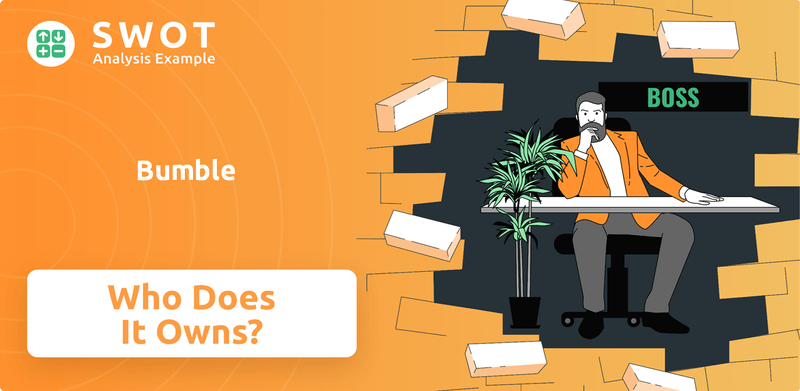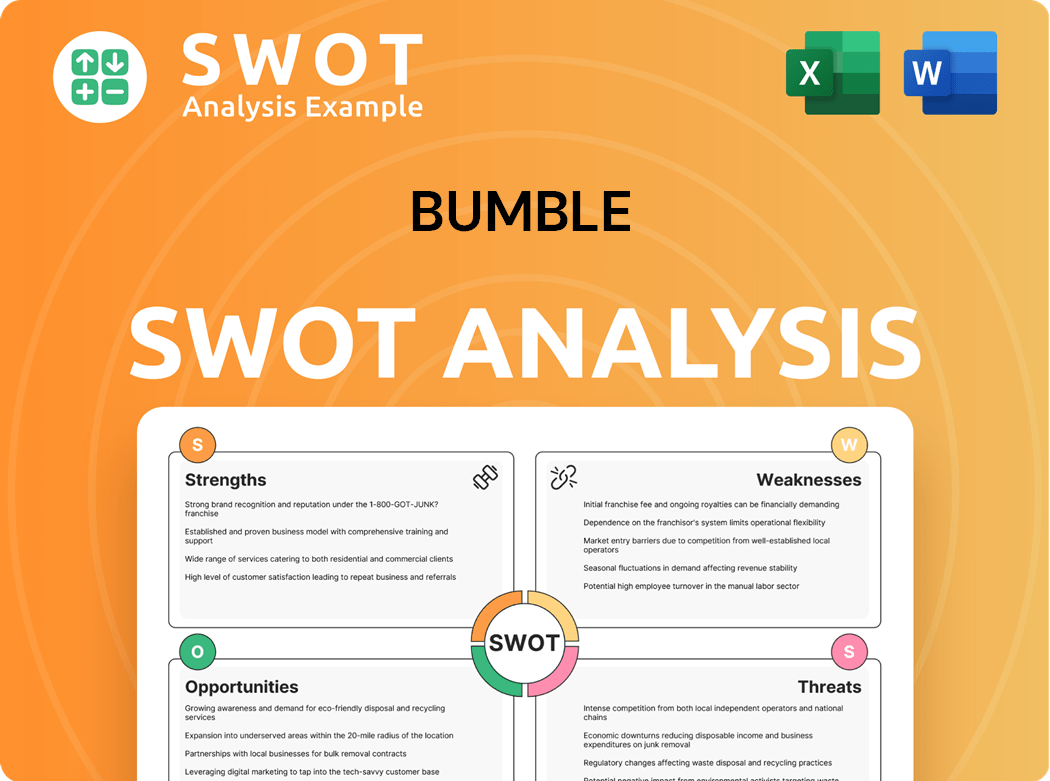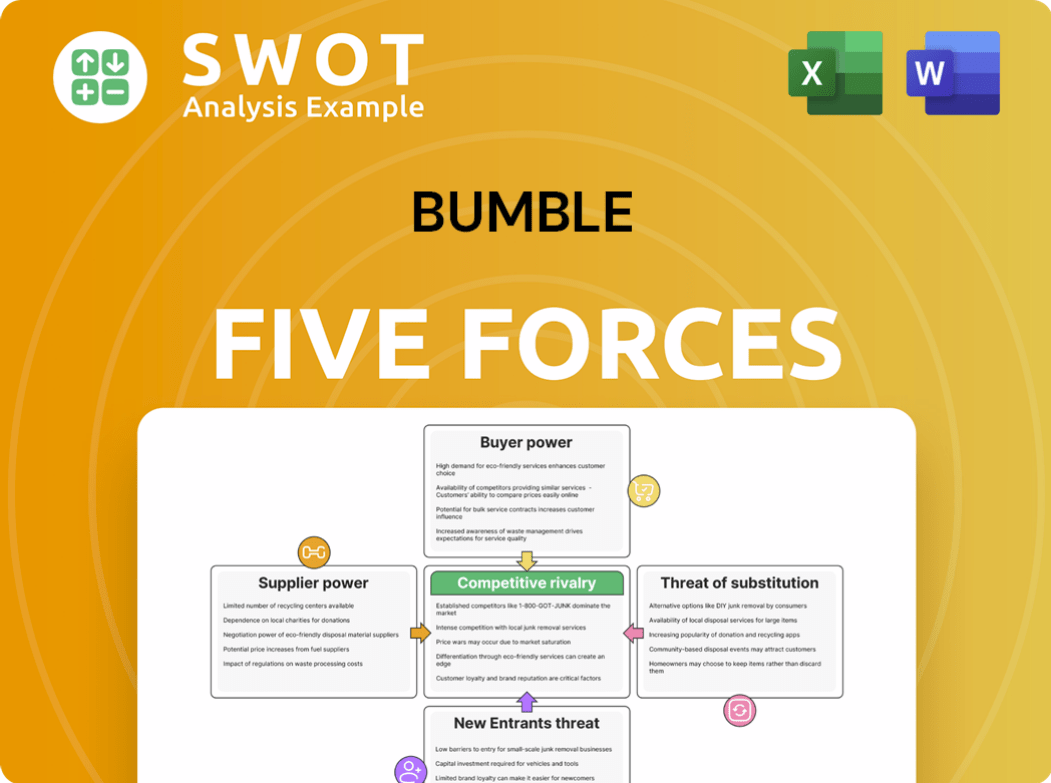Bumble Bundle
Who Really Owns Bumble?
Understanding the ownership structure of Bumble Inc. is crucial for anyone interested in the future of the popular dating app and its parent company. From its inception to its current status as a publicly traded entity, Bumble's ownership has undergone significant changes. This journey has shaped its strategic direction and impact on the online dating landscape. Bumble SWOT Analysis offers deeper insights.

This exploration into Bumble ownership will uncover who owns Bumble, tracing the influence of the Bumble founder, early investors, and current major shareholders. We'll examine how the company's evolution, including its IPO, has impacted its market capitalization and the dynamics of its board of directors. Discover the key players behind the Bumble dating app and its strategic decisions.
Who Founded Bumble?
The story of Bumble's inception begins in 2014, with Whitney Wolfe Herd at the helm, after her departure from Tinder, where she was a co-founder. Her vision for a 'women-first' dating app set the stage for a unique approach in the online dating landscape. This innovative concept quickly garnered attention and investment, shaping the company's early ownership structure.
Andrey Andreev, the founder of Badoo, played a pivotal role in Bumble's early days. He provided an initial investment that was crucial for marketing and growth. This early financial backing was instrumental in launching and scaling the app, setting the foundation for its future success.
The initial ownership of Bumble was significantly influenced by the early investment from Andrey Andreev. His entity, Worldwide Vision Limited, held a substantial majority stake, while Whitney Wolfe Herd retained a significant portion. This structure reflected the financial contributions and strategic vision that propelled Bumble's initial growth.
Whitney Wolfe Herd founded Bumble in 2014. She brought a fresh perspective to the dating app market. Her vision focused on empowering women in online dating.
Andrey Andreev, founder of Badoo, provided early financial backing. His investment was critical for marketing and expansion. This support was key to Bumble's rapid growth.
Worldwide Vision Limited, Andreev's entity, held a significant stake. Whitney Wolfe Herd retained a considerable ownership percentage. App developers also held a small portion of the company.
Christopher Gulczynski and Sarah Mick designed the app's interface. They were instrumental in the app's launch. Their expertise helped shape the user experience.
Wolfe Herd's vision centered on empowering women. This approach differentiated Bumble from competitors. It became a core element of Bumble's mission.
Andreev's initial investment was approximately $10 million. This funding was specifically allocated for marketing and growth initiatives. It was a crucial step in Bumble's early development.
The early ownership of Bumble was shaped by the contributions of its founder, Whitney Wolfe Herd, and the financial backing of Andrey Andreev. The initial investment of approximately $10 million from Andreev was instrumental in the company's initial growth. This funding allowed Bumble to focus on marketing and expansion, which was crucial for establishing its presence in the competitive dating app market. The early ownership structure, with Worldwide Vision Limited holding a 79% stake and Wolfe Herd retaining 20%, reflected the balance between financial investment and the vision for the company. The app developers, Christopher Gulczynski and Sarah Mick, held the remaining 1%, contributing to the app's design and launch. For more insights, you can explore the Growth Strategy of Bumble.
- Whitney Wolfe Herd founded Bumble in 2014 after leaving Tinder.
- Andrey Andreev's investment was critical for early growth.
- Worldwide Vision Limited held a significant majority of the company.
- The app's focus on women's empowerment set it apart.
Bumble SWOT Analysis
- Complete SWOT Breakdown
- Fully Customizable
- Editable in Excel & Word
- Professional Formatting
- Investor-Ready Format

How Has Bumble’s Ownership Changed Over Time?
The evolution of Bumble ownership has been marked by significant shifts, particularly with the involvement of major financial players. The company's journey began with its founding and early investment rounds, setting the stage for its eventual public offering. The acquisition of a majority stake in the Bumble parent company by Blackstone Group Inc. in 2019 was a pivotal moment, valuing the company at $3 billion at the time. This move set the stage for the IPO and further shaped the ownership landscape.
Bumble's Initial Public Offering (IPO) on February 11, 2021, on the Nasdaq Global Select Market under the symbol 'BMBL' was a landmark event. The IPO raised $2.15 billion, with shares opening at $76 and closing at $70.31. This valued the company at approximately $14 billion, including debt. Following the IPO, the ownership structure solidified, with Blackstone and Bumble founder Whitney Wolfe Herd holding significant stakes, leveraging a dual-class share structure. This structure gave them considerable voting power relative to their economic ownership. Other early investors, such as Accel and Greycroft, also played a role in shaping the company's financial backing.
| Event | Date | Impact on Ownership |
|---|---|---|
| Blackstone's Acquisition | 2019 | Blackstone acquired a majority stake, valuing the company at $3 billion. |
| Initial Public Offering (IPO) | February 11, 2021 | Raised $2.15 billion; valued the company at approximately $14 billion. |
| Post-IPO Ownership Structure | February 2021 - Present | Blackstone and Whitney Wolfe Herd held majority voting power. |
As of May 15, 2025, SEC filings continue to reveal the ownership stakes of major shareholders. The Bumble stock performance and the company's market capitalization reflect its position in the Bumble dating app market. To understand more about the company's origins, you can read a Brief History of Bumble.
The ownership of Bumble has evolved significantly, with major shifts driven by financial investments and the IPO.
- Blackstone's acquisition in 2019 was a key event.
- The IPO in 2021 marked the company's entry into the public market.
- Blackstone and Whitney Wolfe Herd hold significant voting power.
- Ongoing SEC filings provide insights into current ownership.
Bumble PESTLE Analysis
- Covers All 6 PESTLE Categories
- No Research Needed – Save Hours of Work
- Built by Experts, Trusted by Consultants
- Instant Download, Ready to Use
- 100% Editable, Fully Customizable

Who Sits on Bumble’s Board?
The corporate governance of the company includes a board of directors, structured into three classes, with each director serving a three-year term. As of June 6, 2025, the company held its annual meeting of stockholders, where proposals were voted on by holders of both Class A and Class B common stock. Ann Mather is the Chair of the board of directors.
The company's operational framework utilizes a dual-class share structure. This structure grants significant voting power to the 'Principal Stockholders,' which include Whitney Wolfe Herd and affiliates of The Blackstone Group Inc. This arrangement is designed to facilitate the board's mission-first strategy, reducing potential pressure from activist shareholders focused on short-term goals. The special voting arrangement is set to conclude on February 16, 2028, or when the combined ownership of Herd and Blackstone drops below 7.5% of Class A common stock. This structure significantly impacts the question of Who owns Bumble.
| Board Member | Title | Affiliation |
|---|---|---|
| Ann Mather | Chair of the Board | |
| Whitney Wolfe Herd | Director | Bumble Founder |
| Other Directors | Directors | Various |
The dual-class share structure gives the Principal Stockholders considerable control. Class A common stock generally has one vote per share, but shares held by Principal Stockholders have 10 votes per share. Additionally, holders of Class B common stock, primarily the Principal Stockholders, are entitled to one vote for each Common Unit held in Bumble Holdings. This setup, known as an umbrella partnership-C-corporation (UP-C) structure, allows Herd and Blackstone to hold 'common units' in an unlisted partnership, Buzz Holdings, which are exchangeable for Bumble A shares, providing them with tax benefits. At the time of the IPO in early 2021, Herd and Blackstone collectively held approximately 95% of the combined voting power, despite owning only about 40% of the company's stock.
The company's ownership structure is complex, with a dual-class share system favoring Principal Stockholders.
- Whitney Wolfe Herd and The Blackstone Group Inc. hold significant voting power.
- This structure aims to support long-term strategic goals.
- The special voting arrangement has a defined termination date.
- Understanding the ownership is crucial for investors and stakeholders.
Bumble Business Model Canvas
- Complete 9-Block Business Model Canvas
- Effortlessly Communicate Your Business Strategy
- Investor-Ready BMC Format
- 100% Editable and Customizable
- Clear and Structured Layout

What Recent Changes Have Shaped Bumble’s Ownership Landscape?
Recent years have seen significant shifts in the ownership and leadership of Bumble Inc. Whitney Wolfe Herd, the Bumble founder, transitioned from CEO to Executive Chair in January 2024. Lidiane Jones took over, but Wolfe Herd returned as CEO in mid-March 2025. This leadership change aligns with Bumble's strategic focus on AI enhancements and international market expansion, aiming to improve match quality and user experience. The company has also prioritized cost-saving measures and organizational efficiency.
Financially, Bumble Inc. reported a decrease in total revenue to $247.1 million for the first quarter of 2025, a 7.7% decrease year-over-year. However, for the full year 2024, total revenue increased by 1.9% to $1.07 billion. The company has been active in share repurchases, with $40 million worth of shares repurchased in Q4 2024 and a total of $214 million for the full year 2024. As of March 31, 2025, approximately $50.1 million remained available under its $450.0 million share repurchase program. While institutional ownership is substantial, the general public holds a 27% stake in Bumble. The trends indicate increased institutional ownership and, in some cases, founder dilution as companies mature. Blackstone and Whitney Wolfe Herd have been significant sellers of Bumble stock since the IPO, yet their special voting rights still provide considerable influence. Understanding the current ownership structure is key to assessing the future of the Bumble dating app.
| Metric | Value | Year |
|---|---|---|
| Total Revenue | $247.1 million | Q1 2025 |
| Total Revenue | $1.07 billion | 2024 |
| Share Repurchases (Q4) | $40 million | 2024 |
| Share Repurchases (Full Year) | $214 million | 2024 |
| Remaining Share Repurchase Program | $50.1 million | March 31, 2025 |
The shifts in leadership and financial performance highlight the dynamic nature of Bumble. The company's focus on AI and international growth, coupled with its financial strategies, are crucial for its future. For more context, it's beneficial to compare Bumble with its rivals. You can explore the Competitors Landscape of Bumble for further insights.
Whitney Wolfe Herd transitioned from CEO to Executive Chair in January 2024, then back to CEO in March 2025.
Total revenue for Q1 2025 was $247.1 million. Full-year 2024 revenue reached $1.07 billion.
$40 million in share repurchases in Q4 2024 and $214 million for the full year.
The general public holds a 27% stake, while institutional ownership is significant.
Bumble Porter's Five Forces Analysis
- Covers All 5 Competitive Forces in Detail
- Structured for Consultants, Students, and Founders
- 100% Editable in Microsoft Word & Excel
- Instant Digital Download – Use Immediately
- Compatible with Mac & PC – Fully Unlocked

Related Blogs
- What are Mission Vision & Core Values of Bumble Company?
- What is Competitive Landscape of Bumble Company?
- What is Growth Strategy and Future Prospects of Bumble Company?
- How Does Bumble Company Work?
- What is Sales and Marketing Strategy of Bumble Company?
- What is Brief History of Bumble Company?
- What is Customer Demographics and Target Market of Bumble Company?
Disclaimer
All information, articles, and product details provided on this website are for general informational and educational purposes only. We do not claim any ownership over, nor do we intend to infringe upon, any trademarks, copyrights, logos, brand names, or other intellectual property mentioned or depicted on this site. Such intellectual property remains the property of its respective owners, and any references here are made solely for identification or informational purposes, without implying any affiliation, endorsement, or partnership.
We make no representations or warranties, express or implied, regarding the accuracy, completeness, or suitability of any content or products presented. Nothing on this website should be construed as legal, tax, investment, financial, medical, or other professional advice. In addition, no part of this site—including articles or product references—constitutes a solicitation, recommendation, endorsement, advertisement, or offer to buy or sell any securities, franchises, or other financial instruments, particularly in jurisdictions where such activity would be unlawful.
All content is of a general nature and may not address the specific circumstances of any individual or entity. It is not a substitute for professional advice or services. Any actions you take based on the information provided here are strictly at your own risk. You accept full responsibility for any decisions or outcomes arising from your use of this website and agree to release us from any liability in connection with your use of, or reliance upon, the content or products found herein.